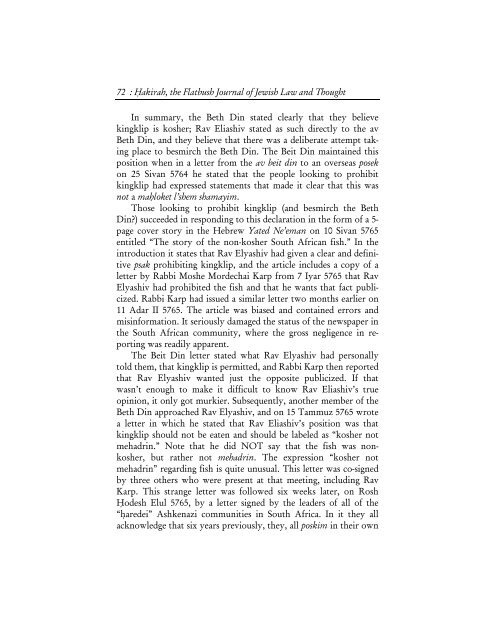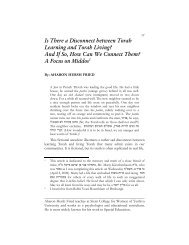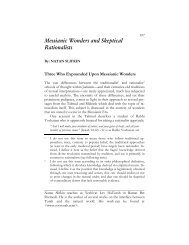The Kashrut of Kingklip: Its Turbulent History and Who ... - Hakirah
The Kashrut of Kingklip: Its Turbulent History and Who ... - Hakirah
The Kashrut of Kingklip: Its Turbulent History and Who ... - Hakirah
You also want an ePaper? Increase the reach of your titles
YUMPU automatically turns print PDFs into web optimized ePapers that Google loves.
72 : Hạkirah, the Flatbush Journal <strong>of</strong> Jewish Law <strong>and</strong> Thought<br />
In summary, the Beth Din stated clearly that they believe<br />
kingklip is kosher; Rav Eliashiv stated as such directly to the av<br />
Beth Din, <strong>and</strong> they believe that there was a deliberate attempt taking<br />
place to besmirch the Beth Din. <strong>The</strong> Beit Din maintained this<br />
position when in a letter from the av beit din to an overseas posek<br />
on 25 Sivan 5764 he stated that the people looking to prohibit<br />
kingklip had expressed statements that made it clear that this was<br />
not a mahloket l’shem shamayim.<br />
Those looking to prohibit kingklip (<strong>and</strong> besmirch the Beth<br />
Din) succeeded in responding to this declaration in the form <strong>of</strong> a 5-<br />
page cover story in the Hebrew Yated Ne’eman on 10 Sivan 5765<br />
entitled “<strong>The</strong> story <strong>of</strong> the non-kosher South African fish.” In the<br />
introduction it states that Rav Elyashiv had given a clear <strong>and</strong> definitive<br />
psak prohibiting kingklip, <strong>and</strong> the article includes a copy <strong>of</strong> a<br />
letter by Rabbi Moshe Mordechai Karp from 7 Iyar 5765 that Rav<br />
Elyashiv had prohibited the fish <strong>and</strong> that he wants that fact publicized.<br />
Rabbi Karp had issued a similar letter two months earlier on<br />
11 Adar II 5765. <strong>The</strong> article was biased <strong>and</strong> contained errors <strong>and</strong><br />
misinformation. It seriously damaged the status <strong>of</strong> the newspaper in<br />
the South African community, where the gross negligence in reporting<br />
was readily apparent.<br />
<strong>The</strong> Beit Din letter stated what Rav Elyashiv had personally<br />
told them, that kingklip is permitted, <strong>and</strong> Rabbi Karp then reported<br />
that Rav Elyashiv wanted just the opposite publicized. If that<br />
wasn’t enough to make it difficult to know Rav Eliashiv’s true<br />
opinion, it only got murkier. Subsequently, another member <strong>of</strong> the<br />
Beth Din approached Rav Elyashiv, <strong>and</strong> on 15 Tammuz 5765 wrote<br />
a letter in which he stated that Rav Eliashiv’s position was that<br />
kingklip should not be eaten <strong>and</strong> should be labeled as “kosher not<br />
mehadrin.” Note that he did NOT say that the fish was nonkosher,<br />
but rather not mehadrin. <strong>The</strong> expression “kosher not<br />
mehadrin” regarding fish is quite unusual. This letter was co-signed<br />
by three others who were present at that meeting, including Rav<br />
Karp. This strange letter was followed six weeks later, on Rosh<br />
Hodesh Elul 5765, by a letter signed by the leaders <strong>of</strong> all <strong>of</strong> the<br />
“haredei” Ashkenazi communities in South Africa. In it they all<br />
acknowledge that six years previously, they, all poskim in their own
















